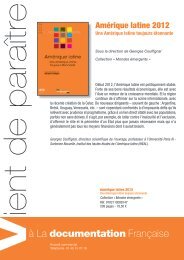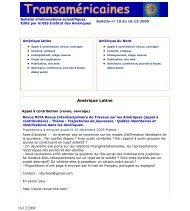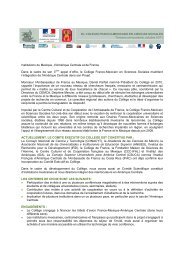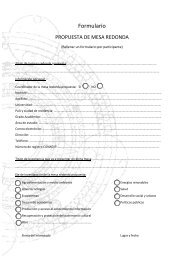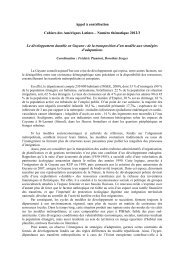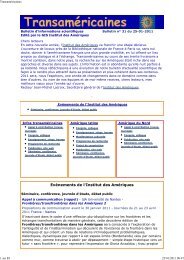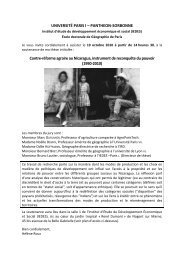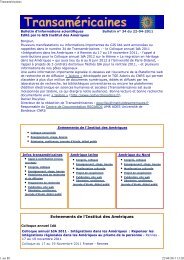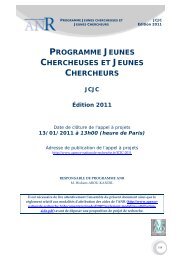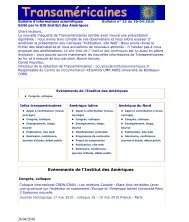Bulletin num. 33 du 25-03-2011 - Institut des Amériques
Bulletin num. 33 du 25-03-2011 - Institut des Amériques
Bulletin num. 33 du 25-03-2011 - Institut des Amériques
You also want an ePaper? Increase the reach of your titles
YUMPU automatically turns print PDFs into web optimized ePapers that Google loves.
Transaméricaines108 sur 111 <strong>25</strong>/<strong>03</strong>/<strong>2011</strong> 10:44Mots-clés : Etats-Unis ; éthanol ; biocarburant ; pipeline ; énergie renouvelable ;cartographiehttp://www.carto-presse.com/Séminaire, conférence, journée d'étude, débat publicCentre for the Study of Democratic Culture University of Sheffield - Informal workshop(call for papers) : New Directions in Transatlantic Social Politics.Propositions de communication avant le 30 avril <strong>2011</strong> ; Atelier en septembre <strong>2011</strong>Royaume Uni - SheffieldIn 1998, Daniel T. Rodgers’s published Atlantic Crossings: Social Politics in a ProgressiveAge. His magisterial study showed how between the 1870s and 1940s Americans,seeking solutions to the problems brought about by rapid urban and in<strong>du</strong>strialtransformation, turned their gaze eastward. Shaken from their exceptionalistassumptions by tumultuous economic and social conflicts of the Gilded Age, successivegenerations of social scientists, planners, and politicians realised they had much to learnfrom an Old World experimenting with new programs like old age pensions,unemployment insurance, and a minimum wage. The major policy achievements of thefirst half of the twentieth century, Rodgers implied, were made in Europe and importedby the United States.By reimagining exceptionalism as a historical mindset that Americans could embrace orreject by measuring their nation against Old World rivals, Rodgers broke the virtualmonopoly of Early Americanists on Atlantic World history. His insights inspired newscholarship on the transnational exchange of social politics in a long Progressive erareaching from the end of the Civil War to the aftermath of World War II. Yet his workraises many unanswered questions, and more than a decade after /Atlantic Crossings/first appeared, we propose to explore new directions in the history of transatlanticexchange.- Rodgers implicitly reaffirms exceptionalism either side of the period 1870-1950; yearsin which, he argues, Americans were ‘peculiarly open’ to foreign ideas. So do we need torethink how we periodise the ‘transatlantic moment’ in social policy ?- Can supposedly localistic and inward-looking social movements such as Populism bestudied as part of a cosmopolitan Atlantic World of ideas too?- How did Atlantic politics change when the United States arguably became a netexporter of ideas after World War II?- In what ways did the flow of ideas and influence between and within conservativenetworks operate differently from, or in ways similar to, those of the progressives andliberals <strong>des</strong>cribed by Rodgers ?We propose an informal workshop in September <strong>2011</strong> to explore new ways of thinkingabout the transatlantic exchange of social thought and policy, broadly defined, from thenineteenth to the late twentieth century. The event will be hosted by the University ofSheffield’s Centre for the Study of Democratic Culture.Potential participants are invited to contact the workshop coordinators with a brief outlineof their research (no more than <strong>25</strong>0 words). The deadline for submissions is 30 April<strong>2011</strong>. Contributions from postgra<strong>du</strong>ate and early career historians are very welcome.Following a second, follow-up conference in early 2012, a selection of papers stemmingfrom the workshop will be submitted for a proposed edited volume with Palgrave USA.- Dr. Andrew Heath a.d.heath@shef.ac.uk- Dr. Daniel Scroop d.scroop@shef.ac.ukSenior Lecturer in American HistoryCo-director, Centre for the Study of Democratic Culture University ofSheffield Department of History Jessop West1 Upper Hanover StreetSheffield, S3 7RAUnited Kingdom



